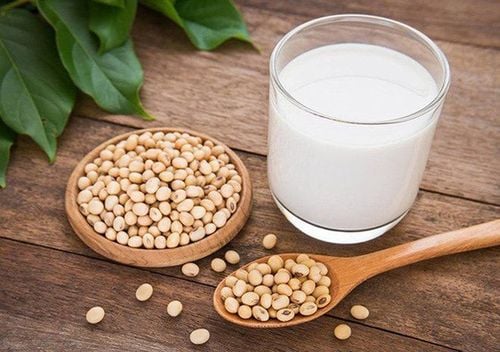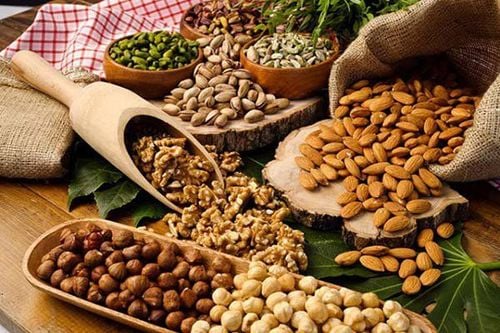This is an automatically translated article.
Nuts are high in fiber, good protein, and healthy fats. Nuts offer a variety of health benefits – especially reducing the risk of heart disease.
1. Nutritional value of nuts
Nuts are very popular foods, used in all diets, from diet, keto to vegetarian. Nuts contain a lot of fat but are healthy fats, good for human health.
Some types of nuts are quite popularly eaten such as: cashews, pecans, walnuts, macadamia nuts, almonds, ... Peanuts are also listed in the list of nutritious nuts, although they are belongs to the legume family, not the pea family. Most of these seeds have a hard outer shell, which we need to peel to be usable.
Nuts are high in fat, low in carbs and a good source of many nutrients, including vitamin E, magnesium and selenium. The carb content of nuts depends on the type of nut. In 28 grams of mixed nuts contain:
Calories: 173 Protein: 5 grams Fat: 16 grams, including 9 grams of monounsaturated fat Carbs: 6 grams Fiber: 3 grams Vitamin E: 12% RDI Magnesium: 16% RDI Phosphorus: 13% RDI Copper: 23% RDI Manganese: 26% RDI Selenium: 56% RDI
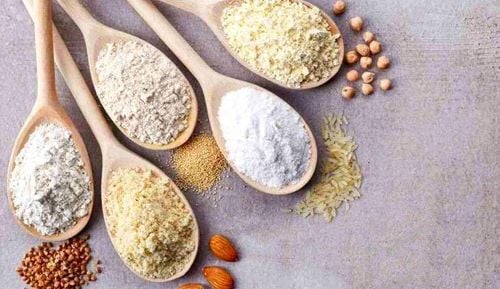
Trong các loại hạt chứa lượng lớn chất dinh dưỡng
Nuts have very high antioxidant power. The seeds contain polyphenols, which can fight oxidative stress by neutralizing free radicals - unstable molecules that can cause cell damage and increase disease risk. One study found that walnuts have a greater ability to fight free radicals than fish.
Nuts help with weight loss: Although known to be high in calories, nuts can actually help with weight loss.
Nuts have an impressive effect when it comes to balancing cholesterol and triglyceride levels. The cholesterol-lowering ability of the seeds is due to their high content of monounsaturated and polyunsaturated fatty acids.
Nuts have strong anti-inflammatory properties, especially in people with diabetes, kidney disease and other serious medical conditions. Inflammation is the body's way of protecting itself from injury, bacteria, and other harmful pathogens. However, chronic inflammation can damage organs and increase the risk of disease. Research shows that eating nuts can reduce inflammation.
Many nuts contain high amounts of fiber, which can reduce your risk of disease, keep you full, reduce calorie absorption, and improve gut health. Here are the nuts with the highest fiber content per 28 grams:
Almonds: 3.5 grams Pistachios: 2.9 grams Hazelnuts: 2.9 grams Pecans: 2.9 grams Peanuts : 2.6 grams Macadamias: 2.4 grams Brazil nuts: 2.1 grams Finally, nuts reduce the risk of heart attack and stroke.
Eating nuts regularly can improve your health in many ways such as reducing the risk of diabetes and heart disease, supporting weight loss.
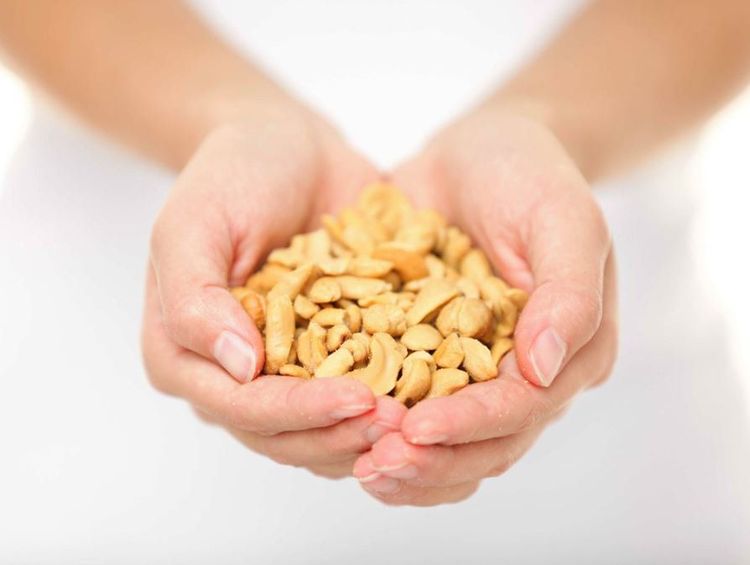
Ăn hạt thường xuyên giúp cải thiện tình trạng sức khoẻ của người dùng
2. Some nuts have many health benefits
2.1. Almonds Almonds are nuts that contain many health benefits. Almonds contain:
Calories: 161 Fat: 14 grams Protein: 6 grams Carbs: 6 grams Fiber: 3.5 grams Vitamin E: 37% Reference Daily Intake (RDI) Magnesium: 19 % RDI Almonds can help improve cholesterol levels in the body. Several studies have found that eating a diet rich in almonds can reduce "bad" LDL cholesterol, total cholesterol, and oxidized LDL cholesterol. At the same time, almonds are added to the diet to lose weight and reduce blood pressure in overweight or obese people. A meal with 28 grams of almonds can help reduce the rise in blood sugar that occurs after a meal by up to 30% in people with diabetes. Almonds also benefit the gut microbiome by supporting the growth of beneficial gut bacteria such as Bifidobacteria and Lactobacillus.
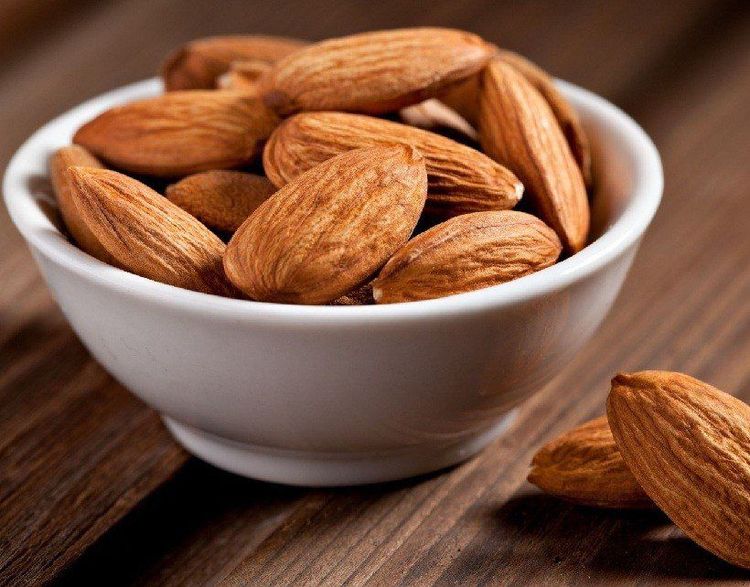
Hạt hạnh nhân chứa nhiều chất dinh dưỡng có lợi cho sức khỏe con người
2.2. Pistachios Pistachios are known to be one of the nuts that are high in fiber. In 28 grams of pistachios contains:
Calories: 156 Fat: 12.5 grams Protein: 6 grams Carbs: 8 grams Fiber: 3 grams Vitamin E: 3% RDI Magnesium: 8% RDI Similar to almonds, Pistachios also help improve cholesterol levels in the body. Eating 2 pistachios a day can help increase good cholesterol (HDL). Pistachios also help improve factors that lead to heart disease such as blood pressure, weight and oxidative status. Oxidative status refers to the levels of oxidized chemicals in the blood, which can cause heart disease.
2.3. Walnuts Walnuts are truly a wonderful source of nutrients. Walnuts contain approximately:
Calories: 182 Fat: 18 grams Protein: 4 grams Carbs: 4 grams Fiber: 2 grams Vitamin E: 1% RDI Magnesium: 11% RDI Walnuts help improve some risk factors for heart disease, significantly reducing total cholesterol and bad cholesterol (LDL), and increasing levels of good cholesterol (HDL).
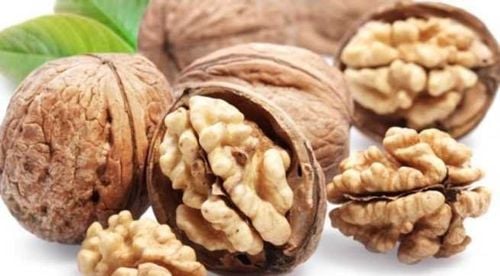
Hình ảnh quả óc chó
2.4. Cashews Cashews have a good nutritional profile. In 28 grams of cashews contain about:
Calories: 155 Fat: 12 grams Protein: 5 grams Carbs: 9 grams Fiber: 1 gram Vitamin E: 1% RDI Magnesium: 20% RDI Cashews help improve lipid levels blood pressure and lower blood pressure.
2.5. Pecans Pecans are commonly used in desserts, and they are also packed with nutrients. In 28 grams of pecans contain approximately:
Calories: 193 Fat: 20 grams Protein: 3 grams Carbs: 4 grams Fiber: 2.5 grams Vitamin E: 2% RDI Magnesium: 8% RDI
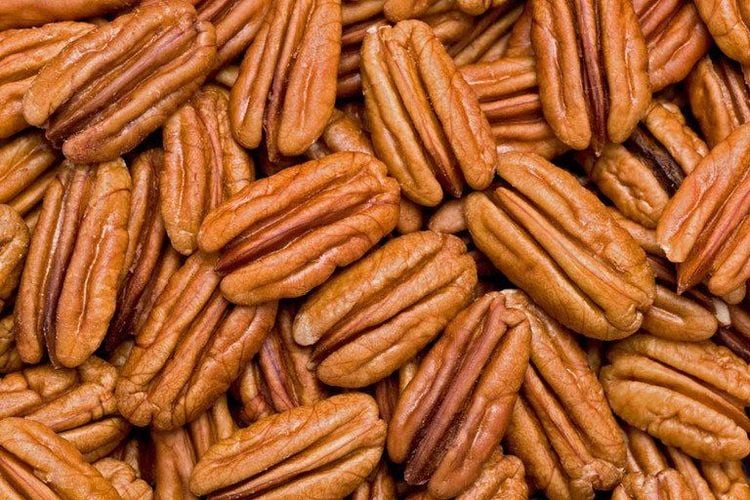
Quả hồ đào thường được dùng trong các món ăn tráng miệng
Pecans contain polyphenols, which are antioxidant compounds. In one study, it was shown that people who ate pecans with 20% of their daily calories showed an improved antioxidant profile in their blood and may help lower bad cholesterol (LDL).
2.6. Macadamia nuts Macca nuts contain a wide range of nutrients and are an excellent source of monounsaturated fats. In 28 grams of macadamia nuts contain:
Calories: 200 Fat: 21 grams Protein: 2 grams Carbs: 4 grams Fiber: 2.5 grams Vitamin E: 1% RDI Magnesium: 9% RDI
2.7. Brazil Nuts Brazil nuts come from a tree in the Amazon. In 28 grams of Brazil nuts contain:
Calories: 182 Fat: 18 grams Protein: 4 grams Carbs: 3 grams Fiber: 2 grams Vitamin E: 8% RDI Magnesium: 26% RDI Nuts are a great source of selenium equally rich. Selenium is an antioxidant mineral. We can get selenium through our diet. Just eating 28 grams of Brazil nuts provides the body with more than 100% of the RDI of selenium needed. Selenium deficiency is rare and usually occurs only in certain diseases such as those undergoing hemodialysis. When these people ate just one Brazil nut a day for three months, that patient's blood selenium levels returned to normal.
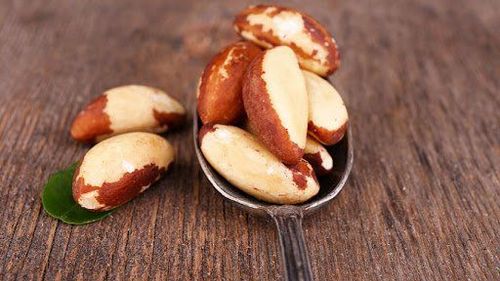
Hạt quả hạch Brazil có nguồn selen tốt cho sức khoẻ người sử dụng
2.8. Pistachios In 28 grams of pistachios contains:
Calories: 176 Fat: 9 grams Protein: 6 grams Carbs: 6 grams Fiber: 3.5 grams Vitamin E: 37% RDI Magnesium: 20% RDI Pistachios are high in nutrients like vitamin E. They can also reduce risk factors for heart disease.
2.9. Peanuts Peanuts are not in the nut family, but in the legume family. However, the nutritional value of peanuts is comparable to that of nuts. In 28 grams of roasted peanuts contain:
Calories: 176 Fat: 17 grams Protein: 4 grams Carbs: 5 grams Fiber: 3 grams Vitamin E: 21% RDI Magnesium: 11% RDI Peanuts help improve factors lead to heart disease, reducing the incidence of type 2 diabetes.
Reference source: healthline.com; webmd.com







